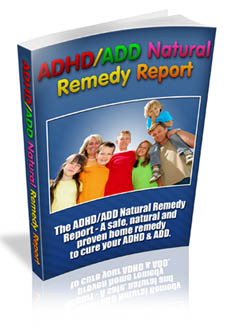Neurofeedback is one of the more interesting experimental therapies for ADHD. This technique uses electronic machines to teach kids with ADHD to slow down or speed up their brain waves - electronic signals in the brain. In one study neurofeedback was used in kids who attended four 50-minute sessions (twice a week for two weeks).
In this small study, Ritalin use dropped from 30 percent to 6 percent. The parents reported improvements in inattention, impulsivity, and concentration. More surprising was an average 12-point jump in the kids' IQs. Other studies have also shown positive effects. Controlled studies are now testing this technique.
Natural therapies have virtually no research to tell us if they are safe or effective. Nevertheless, they are increasingly being promoted for ADHD - via TV and radio infomercials and on the Internet. Just a few include products like Efalex Focus, Pedi-Active, Kid's Companion Attention/Memory Formula, and many, many others.
It's not uncommon to see manufacturers creating a wide variety of formulas based upon either animal research or extremely preliminary and limited human research. Then, they often will make big leaps to claim clinical effectiveness. Here are just a few examples that you might come across. Adhd Alternative Treatments Adults
Essential fatty acids (EFAs), such as gamma-linolenic acid (GLA) and docosahexaenoic acid (DHA), are sometimes low in kids with ADHD ... but so far, there's no convincing evidence that replacing these nutrients helps.
Phosphatidylserine, a biologically active chemical commonly called PS, is normally found in the central nervous system (CNS) - the brain, spinal cord, and nerves. PS has been shown to improve cognitive function in Alzheimer's patients ... but the effectiveness of PS in ADHD has not been proven.
Acetyl-carnitine is used to increase the neurotransmitter acetylcholine in the CNS. It can improve memory in elderly patients with dementia ... hut there's no proof that it's beneficial for ADHD.
DMAE (dimethylaminoethanol), also called deanol, is a precursor to acetylcholine. It was marketed years ago as a prescription medication for ADHD called Deaner, but it was discontinued because it didn't work very well. As for deanol, which is still available, the Natural Medicines Cornprehensive Database says, "Clinical studies using deanol for treating attention deficit disorder have produced inconclusive results."
Ginkgo biloba is a natural medicine that is commonly used to enhance cognitive function, but there's no reliable evidence that it will help patients with ADHD and no evidence that it is safe in children.
Ephedra (also called Ma huang) has stimulant effects, but it's not necessarily safe or effective for treating ADHD.
Increasing reports of fatalities and severe side effects of this herb are leading more and more experts to condemn its use - especially in children.
The Natural Database says that the use of Ephedra is "possibly unsafe when used orally. There is concern that use of ephedra can cause severe life threatening or disabling adverse effects in some people." As for its use in childrea, the Database says, "Children can be more susceptible to the adverse effects of ephedra."
In fact, experts are now warning against giving most herbs or supplements to children because of potential side effects. Further, most herbs and supplements have never been tested in children or teenagers. One expert source says, "Steer parents away from these unproven treatments. Remind them that 'natural' doesn't necessarily mean safe."
Trustworthy Natural Medicines
Because so much of the advertising about natural medicines (herbs, vitamins, and supplements) is false or misleading and because labeling of these products in the U.S. can be false or deceptive, it is valuable to have an accurate, evidence-based, and trustworthy source for information about these substances. Adhd Alternative Treatments Adults
In my opinion, the two best Web sites are
(1) the Natural Medicines Comprehensive Database (the best for up-to-date, objective information about herbs, vitamins, and supplements) and
(2) ConsumerLab.com.
The latter site is an independent testing lab that has tested hundreds of natural medications. Both sites are expensive and require a subscription to access; however, they are less expensive than a bottle or two of many supplements! (ConsumerLab.com offers many free reports, but more extensive reports require subscription.) To access the sites, go to www.naturaldatabase.com or www.ConsumerLab.com.
The proper care for people with ADHD never involves just medication. There are many aspects of living with ADHD that simply cannot be treated with a medication. Nevertheless, in seeking the optimal approach to treating ADHD, medication may play an extremely important role - but it's not the only answer.
On the other hand, as we've discussed, stimulant medications definitely work for the majority of ADHD cases. In most cases, it is not a question of whether the medication works - it works extremely well for most children who have this condition. Nevertheless, medications should be seen only as a tool that helps the child's caregivers implement behavior management, parenting, and teaching strategies that help this child come to more maturity.
You can also look for more information at Adhd Alternative Treatments Adults.

